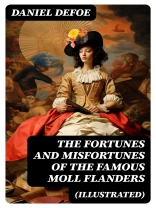Daniel Defoe’s ‘The Fortunes and Misfortunes of the Famous Moll Flanders’ is a seminal work in the genre of English realist fiction, offering a vivid depiction of 18th-century English society through the life of its resilient protagonist, Moll. The novel combines humor and tragedy, detailing Moll’s tumultuous adventures as she navigates the treacherous waters of love, crime, and survival. The illustrative edition enhances Defoe’s prose, lending a visual dimension that underscores the stark realities and complex emotions experienced by Moll as she grapples with issues of gender, class, and morality in a rapidly changing world. Defoe, a master of narrative and a keen observer of social dynamics, draws from his own experiences as a writer, merchant, and pamphleteer. His life, marked by financial struggles and societal critiques, profoundly influenced his portrayal of Moll’s plight, embodying the struggles and aspirations of women in a patriarchal society. Defoe’s background in political involvement and his interest in real-life stories provided a rich context for the themes of resilience and reinvention explored in this groundbreaking novel. Recommended for readers interested in early modern literature and the evolution of the novel, Defoe’s work engages with timeless themes of agency and survival. Both entertaining and thought-provoking, this illustrated edition of ‘Moll Flanders’ invites contemporary readers to reflect on societal norms while enjoying the adventures of its unforgettable heroine.
Giới thiệu về tác giả
Daniel Defoe, an esteemed English novelist, pamphleteer, and journalist, was born around 1660 and is best known for his significant contribution to the early development of the English novel. Defoe’s range of writing extends beyond fiction to a wealth of political and religious pamphlets, reflecting his deep involvement in the issues of his time. Amidst his diverse literary oeuvre, ‘The Fortunes and Misfortunes of the Famous Moll Flanders (Illustrated)’ stands out as a landmark work. The novel offers a vivid portrayal of a woman’s life in the 17th century, navigating through her various travails and quests for survival. Defoe’s Moll Flanders explores themes such as redemption and societal norms, underlining his pioneering use of realism, which was instrumental in shaping the novel as a literary form. Much of Defoe’s writing, including Moll Flanders, is marked by detailed firsthand observations, a journalistic detail that lays the framework for his narrative style. His characters often journey through the complexities of morality, the law, and socio-economic circumstances, a testament to his ability to weave richly textured stories that resonate to this day. Moreover, Defoe’s innovation in narrative form, particularly the use of first-person perspective and the integration of realistic fictional memoirs, has cemented his reputation as a forerunner in the evolution of the modern novel.












